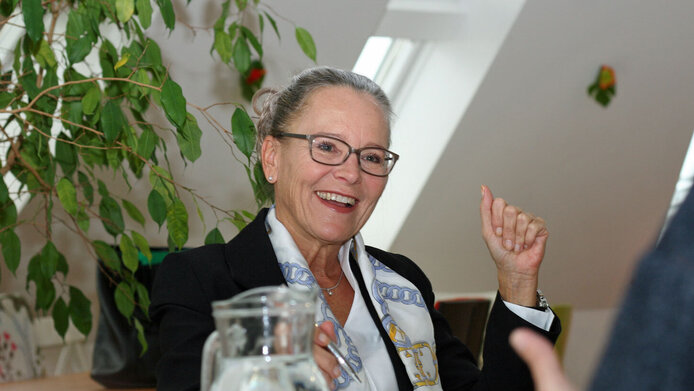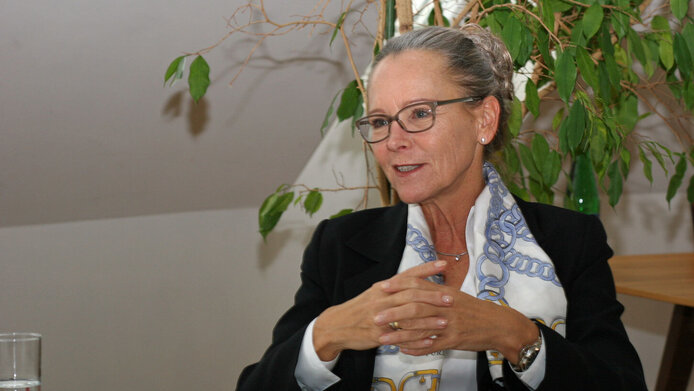Sponsoring knowledge for the planet

Ms. Müller-Taborsky, what is your motivation to volunteer for involvement in the FWF's alpha+ Foundation?
Susanne Müller-Taborsky: We face major future challenges, and research has a central role to play in this. We need people who generate new knowledge that will sooner or later become generally valid. I have always been fascinated by new principles changing our thinking and knowledge of the world. Today probably everyone knows their blood group, a system which was discovered over 100 years ago by Nobel Prize laureate Karl Landsteiner. That was pioneering work, as was the discovery of the gene scissors, which won the Nobel Prize in 2020 and constitutes a beacon of hope for medicine and agriculture. I am invested in raising awareness of the extent to which science is part of our everyday lives.
It's usually a long way from basic research to application. Why should affluent individuals invest in this area, rather than in others?
Müller-Taborksy: That's exactly my point: basic research provides the starting point for concrete applications. Even if you don’t know for certain whether a good result will be achieved, you have to sow the seed so that you can “reap the fruits” of basic research. If we succeed in creating more awareness for this and getting people to care by sharing science stories, then they will be more willing to do something for research. Semmelweis, too, had to wait a very long time before his hygiene measures were generally accepted. Initially there were doubts even in professional circles. Today, and particularly since the coronavirus epidemic, we know that disinfecting your hands helps protect yourself against infection from pathogens.
How can you engage people?
Müller-Taborsky: I consider it important to create networks of people. We have to bridge the gap between researchers and the business community and the general public. When it comes to the climate, in particular, we need a lot of research and new knowledge from a wide range of disciplines. In order for this networking to succeed, we need role models who can get across what their work means. People like Georg Kaser, for instance, a member of the FWF Executive Board. He is not only a world-renowned climate researcher, but has also recently been involved in the Austrian Climate Council, in which citizens from all parts of society defined climate goals for Austria. And he is well-known in public. We also approach researchers who have made a career abroad and now want to give something back to Austria, and we continue to approach private individuals and interested companies.
What is your take on the coronavirus crisis? - Did it hinder or help the public recognition of science?
Müller-Taborsky: It was a time when the spotlights were absolutely on research and science, whether on medical or complexity research, and for the most part this expertise was viewed positively. But we know that the coronavirus situation has polarized the public. It’s my personal impression that it was sometimes less about questioning science and more about criticizing the system. People often don't want to be told how to lead their lives –that's also true in respect of the climate crisis, by the way.
You worked in private banking for a long time. What is your impression of the willingness of wealthy people in Austria to get involved in activities for the common good?
Müller-Taborsky: It’sdifficult to put numbers on this. The fact is that there are many wealthy people in our country, and the willingness to donate is also pronounced. In total, more than 70 percent of Austrians donate money, and among those over 60 it’s more than 80 percent. But there is still potential when it comes to large donations. Currently, only two percent of donations are over EUR 1,000. Wealthy individuals often see large donations as a “strategic investment”. The return in that case is the positive effect the donation can achieve both for them and for the community. In line with the objectives of the alpha+ Foundation, it is important to approach people who share the social and economic impact of basic research and have an emotional connection to science.
In 2015, an amendment to the law has brought some new momentum for the non-profit foundation sector. Some universities have established foundations, for instance. Can this momentum be harnessed for the common good?
Müller-Taborsky: A lot has happened since the non-profit law package. More than 120 new non-profit foundations have been established since then. Even though we are sometimes in competition with others, it makes sense to network. Our common goal is to boost philanthropy in this country, meaning to create awareness for the fact that we can all do something to make a difference. While this cannot be done without the public sector, private individuals can also make a contribution. When a whole society feels that research is important, that makes a difference. Developing such a culture in this country is part of our task, and I would like to make a contribution.
Do we need more political incentives?
The 2015 amendment has already been a step in the right direction. One should reconsider the three-year waiting period before donations to a newly established foundation can become tax-deductible. An entity is either charitable or it isn’t. Last year, around 40 percent of all donations went to institutions that are on the list of tax-deductible charities.
How can civil society benefit from donations to the alpha+ Foundation?
Müller-Taborsky: The Foundation focuses on sustainability and the climate. And we want to support young researchers in their (climate) research projects. In this way, we appeal to major donors, as well as people who have fewer resources at their disposal but want to make a difference. The Rückenwind funding bonus, for example, which supports the scientific careers of up-and-coming talents, is an opportunity to get involved on a smaller scale, to come into contact with young researchers and to make a lasting contribution to society and our climate.
Highly endowed awards such as the “Shaping the Future Award” are designed to invite donors to raise the impact for economic and ecological sustainability. Austria is a country with a strong research and innovation track record. The focus of the Foundation is on increasing the visibility of these achievements, thus raising awareness of the relevance of basic research. This involves cooperation with existing and new players in order to achieve this goal together.
Are there any topics of particular importance to you personally?
Müller-Taborsky: I have two children and obviously I want to be able to leave them a world that is nice to live in. In order to do this, we need research from a wide range of disciplines, and joint commitment across society. The FWF has the advantage of supporting researchers at the top level and of doing this transparently across all thematic areas. Our climate needs research.
Do you have a motto to live by?
Müller-Taborsky: I have always been curious about what the future will bring. Curiosity is also what drives science, and it is the basis for new knowledge. We have something in common here.
Susanne Müller-Taborsky has been an honorary Board Member of the alpha+ Foundation of the Austrian Science Fund FWF since August 2022. She is a finance expert and has held various management positions in private banking, most recently as head of Premium Banking at UniCredit Bank Austria.
More information: www.alphaplusstiftung.at






